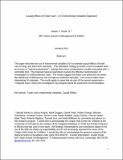Causal effects of foster care: An instrumental-variables approach
Author(s)
Doyle, Joseph J
Downloadbf01d9613643092efab79d96f8dfd375623b.pdf (293.6Kb)
PUBLISHER_CC
Publisher with Creative Commons License
Creative Commons Attribution
Terms of use
Metadata
Show full item recordAbstract
This paper describes the use of instrumental-variables (IV) to estimate causal effects of foster care on long- and short-term outcomes. This estimation strategy provides a tool to evaluate what are known as "natural experiments": settings that mimic randomization usually associated with a controlled trial. The proposed natural experiment involves the effective randomization of investigators to child-protection cases. The results suggest that foster care placement increases like likelihood of delinquency and emergency healthcare episodes. Care must be taken when interpreting IV estimates. The results apply to cases that are part of the natural experiment-"marginal cases" where the investigators may disagree about the placement recommendation. Keywords: Foster care; Instrumental variables; Causal effects
Date issued
2011-03Department
Sloan School of ManagementJournal
Children and Youth Services Review
Publisher
Elsevier BV
Citation
Doyle, Joseph J. “Causal Effects of Foster Care: An Instrumental-Variables Approach.” Children and Youth Services Review 35, 7 (July 2013): 1143–1151 © 2011 Elsevier Ltd
Version: Original manuscript
ISSN
0190-7409